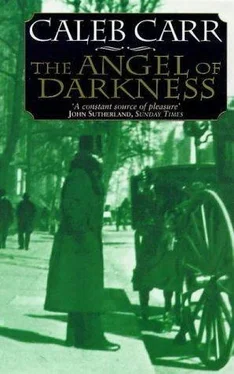Caleb Carr - The Angel Of Darkness
Здесь есть возможность читать онлайн «Caleb Carr - The Angel Of Darkness» весь текст электронной книги совершенно бесплатно (целиком полную версию без сокращений). В некоторых случаях можно слушать аудио, скачать через торрент в формате fb2 и присутствует краткое содержание. Жанр: Детектив, на английском языке. Описание произведения, (предисловие) а так же отзывы посетителей доступны на портале библиотеки ЛибКат.
- Название:The Angel Of Darkness
- Автор:
- Жанр:
- Год:неизвестен
- ISBN:нет данных
- Рейтинг книги:5 / 5. Голосов: 1
-
Избранное:Добавить в избранное
- Отзывы:
-
Ваша оценка:
- 100
- 1
- 2
- 3
- 4
- 5
The Angel Of Darkness: краткое содержание, описание и аннотация
Предлагаем к чтению аннотацию, описание, краткое содержание или предисловие (зависит от того, что написал сам автор книги «The Angel Of Darkness»). Если вы не нашли необходимую информацию о книге — напишите в комментариях, мы постараемся отыскать её.
The Angel Of Darkness — читать онлайн бесплатно полную книгу (весь текст) целиком
Ниже представлен текст книги, разбитый по страницам. Система сохранения места последней прочитанной страницы, позволяет с удобством читать онлайн бесплатно книгу «The Angel Of Darkness», без необходимости каждый раз заново искать на чём Вы остановились. Поставьте закладку, и сможете в любой момент перейти на страницу, на которой закончили чтение.
Интервал:
Закладка:
“And who,” Mr. Moore asked indignantly, “very often accompanies me?”
“You miss my point,” the Doctor answered. “Sometimes, after these bouts of marginal self-destruction, you must spend hours caring for yourself, nurturing yourself, as if you were a child. Where is the consistency in that ?”
“All right, all right,” Mr. Moore said in annoyance. “But it’s a long jump from mocking my bad habits to showing how a woman can be nurturing-can be a nurse in natal care, for Christ’s sake- and harbor a desire to kill infants, and be sane, all at the same time.”
“Has your research helped you at all, Doctor?” Lucius asked.
“I fear not,” he answered with the same gloominess he’d shown on the subject for days. “As I’ve told Sara, there is precious little in the current psychological literature that touches on the subject. Both Krafft-Ebing and Freud are willing to discuss the sexual dimension of a mother’s relationship to her children, particularly in the context of male children. And such men will even discuss the desire of children to destroy their parents, either literally or figuratively, again emphasizing boys. In addition, there are some explorations of violence by men against children, although these usually occur within broader discussions of the secondary effects of alcoholism and drug addiction. But I have searched in vain for truly meaningful discussions of women attacking children that are in their care, whether the children are their own or someone else’s. The general consensus is that such cases are either extreme or delayed manifestations of postpartum psychosis or, where that cannot be made to apply, mental disease of unknown etiology. I’m afraid that legal records and explorations have been far more helpful than psychological ones, in this respect.”
“Really?” Marcus said with some surprise: he’d had a fair degree of legal training before joining the force. “Progressive thinking from lawyers-that’s a switch.”
“Indeed,” the Doctor replied. “And I don’t mean to imply that there’s been anything like a systematic study of the phenomenon in legal or judicial circles. But the courts are forced to acknowledge the realities that are placed before them-and those realities, all too often, include cases of mothers, governesses, and other adult women committing violence against children. Very often infants.”
“But if I’m not wrong,” Marcus commented, “the act of infanticide is usually laid at one of two doors in the legal system: poverty or illegitimacy.”
“True, Marcus-but there have been cases, even a few celebrated ones, that could not be explained by either the mother’s being too poor to support the child or her being unmarried. Nor could they be hidden under the rug with a sweeping pronouncement of some unknown kind of insanity. You will recall the case of Lydia Sherman?”
At the drop of that infamous name, which occurred just as we were making our way across Forty-second Street on Eighth Avenue, both of the Isaacsons and Miss Howard went into a kind of rapture.
“Lydia Sherman,” Lucius said wistfully. “ ‘Queen Poisoner.’ Now, there was a case…”
“We’ll never know how many people she actually murdered,” Marcus said in the same tone. “It could’ve been dozens .”
“And,” Miss Howard added, bringing things a bit more to the point, “some of them were children-including her own children. And she was neither poor nor unmarried when she poisoned them.”
“Exactly, Sara,” the Doctor said. “She had killed the children’s father, desired to marry again, and found her children to be simply, as she put it, ‘in the way.’ The newspaper accounts were quite abundant. But as far as the alienists of the day, as well as those of subsequent years, were concerned, the case might as well have never existed-even though many of them judged her to be perfectly sane at her trial, and that was a good twenty-five years ago.”
“I hate to break up this little admiration society,” Mr. Moore said, “but Lydia Sherman was no nurse-she was a lying fortune hunter.”
“Yes, John,” Miss Howard said, “but a living demonstration that the simple accident of being born a woman doesn’t necessarily bring with it a talent for nurturing-or even an inclination toward it.”
“And by using her case, along with similar examples,” the Doctor added, “we can dispense with Professor James’s sentimental drivel about the parental instinct being stronger in women than in men and the nobility of the mother caring for the sick child. Lydia Sherman had sick children, to be sure, but she’d made them sick by poisoning them with arsenic-and her noble ministrations consisted of further doses of the same poison. No, I am increasingly brought back to a single brief statement that I encountered several days ago-”
Miss Howard guessed what he was referring to: “Herr Schneider’s remark about maternal egotism.”
The Doctor nodded. “For the benefit of the rest of you, Schneider noted that the mother, once her baby is delivered, transfers-and I quote-‘her entire egotism to the child.’ ”
“How’s that supposed to help us?” Mr. Moore asked. “The children at the Lying-in Hospital weren’t the Hunter woman’s, and neither is the Linares kid.”
“But the way in which she took Ana,” Lucius said, “indicates that she may have felt-how did you put it, Marcus? That she felt entitled to the child?”
“Correct.” I heard the Doctor snap his cigarette case closed. “And never forget her behavior on the train-caring for the child as if it were her own . Then, too, such psychological bonding often occurs between nurses and patients in general-especially where children are concerned. This is unquestionably not a woman to let something like what Sara refers to as the ‘accident of birth’ prevent her from feeling maternal in an intensely proprietary fashion about other people’s children. That much is obvious, John.”
“Oh,” Mr. Moore said, lighting up a stick of his own. “Sorry I missed it, then.” I could hear him letting out some smoke, and then he spoke more pointedly to the Doctor. “But you’re mixing something up, Kreizler. Let’s say all this is true, and she has these feelings about any kid she takes a shine to-for whatever reason, she ‘transfers her egotism to them.’ Fine-but unlike your very considerate example of my personal habits, she starts from a nurturing attitude and moves toward a destructive one. None of the kids are sick when she gets hold of them-but they end up dead. What happens? They can’t be ‘in the way,’ like Lydia Sherman’s children were-these are kids she’s picked out and chosen to put herself close to. So what happens?”
“Excellent, Moore,” the Doctor said. “That is the true mystery of this case. The woman invests her entire self-worth in these infants; yet she destroys them. What, indeed, happens?”
“Could it be a form of indirect suicide?” Lucius asked.
“No-too easy,” Miss Howard said. “If you’ll pardon my saying so, Lucius. How many times can you kill yourself, even by proxy? I think-I think we need to stay with the ideas we were discussing at the museum, Doctor. The duality-woman as creator alongside woman as destroyer.”
A general sort of “Wha-?” sound came out of the others all at once, to which Miss Howard and the Doctor gave out with a brief summary of their thoughts outside the Metropolitan.
“Then you’re saying that some part of this woman identifies with the notion of a woman having destructive power?” Marcus asked.
“Why not?” Miss Howard said simply. “Haven’t you ever in your life identified with a destructive male figure, Marcus?”
Читать дальшеИнтервал:
Закладка:
Похожие книги на «The Angel Of Darkness»
Представляем Вашему вниманию похожие книги на «The Angel Of Darkness» списком для выбора. Мы отобрали схожую по названию и смыслу литературу в надежде предоставить читателям больше вариантов отыскать новые, интересные, ещё непрочитанные произведения.
Обсуждение, отзывы о книге «The Angel Of Darkness» и просто собственные мнения читателей. Оставьте ваши комментарии, напишите, что Вы думаете о произведении, его смысле или главных героях. Укажите что конкретно понравилось, а что нет, и почему Вы так считаете.











